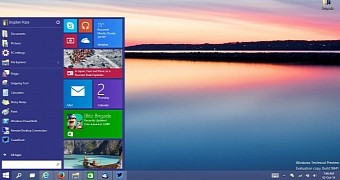A few months ago, soon after Microsoft released the official download links for Windows 10 Technical Preview and we found its system requirements as well, we were told that both new and old computers should be able to run the operating system with little effort.
System requirements haven't changed too much since Windows Vista came to be and they will remain the same in Windows 10 as well, so computers running this old operating system should also be able to run the modern version.
That's what Gabriel Aul, head of the Windows Insider boss, has said in a short tweet today, confirming that Microsoft has been hard at work to keep system requirements unchanged when developing a new version of Windows.
Windows 10 system requirements
It's a well-known fact that Windows Vista wasn't quite the most reliable operating system at first, so its small market share doesn't come as a big surprise, but if you still run it right now, your computer should have no issue to cope with Windows 10 without any hardware upgrade.
Here are the current system requirements of Windows 10 Technical Preview, which are very unlikely to change in the final version of the operating system:
Processor: 1 gigahertz (GHz) or faster RAM: 1 gigabyte (GB) (32-bit) or 2 GB (64-bit) Free hard disk space: 16 GB Graphics card: Microsoft DirectX 9 graphics device with WDDM driver A Microsoft account and Internet access
And if you're wondering, here are the system requirements of Windows Vista, which are very similar to those of Windows 10:
1-gigahertz (GHz) 32-bit (x86) processor or 1-GHz 64-bit (x64) processor 1 GB of system memory 128 MB of graphics memory (minimum) 40-GB hard disk that has 15 GB of free hard disk space (the 15 GB of free space provides room for temporary file storage during the install or upgrade)
Microsoft hoping to convince users to upgrade
One of the reasons Microsoft decided to keep system requirements unchanged is its effort to move users from old Windows versions to new ones, so offering a new operating system that would run on old hardware is clearly a must in this case.
Windows XP users, on the other hand, have no other option than to upgrade, as their old PCs won't have what it takes to run Windows 10. At least not without hardware upgrade.
@kiranbabutvm System requirements for Win10 are same as for Win8 (was mostly same as 7 and Vista.) Older PCs can upgrade, w/ some exceptions
— Gabriel Aul (@GabeAul) January 14, 2015

 14 DAY TRIAL //
14 DAY TRIAL //